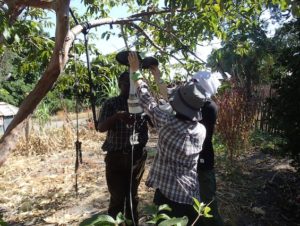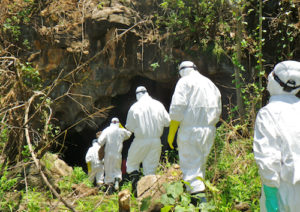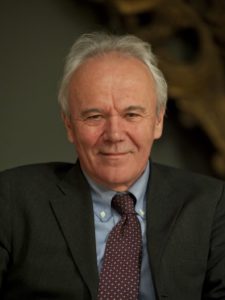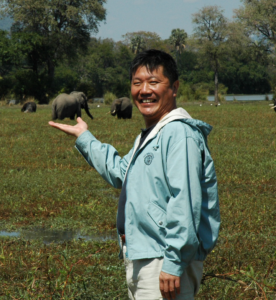GVN Welcomes New Zambia Affiliate
GVN Welcomes New Zambia Affiliate

The team in Zambia collect mosquitoes and set mosquito traps.
In January, the Africa Center of Excellence for Infectious Diseases of Humans and Animals (ACEIDHA) at the University of Zambia (UNZA) in Lusaka, Zambia became the newest GVN Affiliate member. ACEIDHA will partner with two longtime GVN Centers of Excellence, Hokkaido University (HU) in Sapporo, Japan and University College Dublin (UCD) in Dublin, Ireland. As an Affiliate, ACEIDHA will strengthen GVN’s presence in Africa and support the network’s mission of preparing the world for future outbreaks of viral disease.
“We are very proud of being accepted as an Affiliate member of the GVN,” says Aaron Mweene, PhD, MSc, BVM, director of ACEIDHA, and professor of virology at the University of Zambia. “Africa is the epicenter of emerging and zoonotic viral diseases,” says Prof. Mweene. “But we don’t have adequate capacity, infrastructure, or resources to combat these diseases. Partnering with GVN will allow us to do much more than we otherwise could.”
ACEIDHA has a fixed biosafety level 2 (BSL-2), BSL-3 and mobile BSL-3-equivalent facilities, which allow for the study of avian influenza, hemorrhagic fever, African swine fever, as well as the isolation and characterization of rabies viruses. It also has infrastructure and capacity to diagnose Ebola, Marburg, Yellow fever, Rift Valley fever, Crimean-Congo hemorrhagic fever, dengue, West Nile fever, chikungunya, Zika, and many arenavirus infections.
Partnership Allows for Pooling of Expertise

The team in Zambia research bats from a cave.
The partnership allows for the pooling of expertise in different areas in veterinary, clinical and basic research. Together, ACEIDHA, HU and UCD have developed programs to identify new, emerging and re-emerging viruses. These research activities include mosquito collection and analysis by conventional polymerase chain reaction and next-generation sequencing as well as classical virus isolation and characterization. In addition, HU has close ties with the Japanese pharmaceutical industry, which will provide access to screening for a wide variety of antiviral drugs. The collaboration between these institutions will help GVN in its efforts to mitigate the urgent epidemic and pandemic threats posed by viral agents.
The University of Zambia and HU have had a long partnership, as have Hokkaido and UCD. For over 30 years, many of the University of Zambia’s faculty have trained at HU, and numerous Japanese faculty have had positions at the University of Zambia, working closely with their African colleagues. “I first visited Zambia in 2005,” says Hirofumi Sawa, MD, PhD, who is the Deputy Director of the Research Center for Zoonosis Control (CZC) at Hokkaido University, as well as professor of molecular pathobiology at the University. “I have visited the country over 50 times since then, and consider it a second home. My laboratory in Sapporo includes young Zambian scientists and we conduct field trips three or four times a year.”

Dr. Aaron Mweene
Prof. Mweene, the director of ACEIDHA, is one of those who trained at Hokkaido University: he received his PhD at HU in 1997 and did a post-doc there as well. After completing his studies in Japan, Prof. Mweene returned to Zambia to work in the field of viral zoonosis. His scientific and educational efforts at the UNZA eventually led to the establishment of ACEIDHA.
Working together, UNZA/ACEIDHA, HU and UCD have identified and characterized a novel hemorrhagic nairovirus from bats. They have also collaborated on surveillance for orthopoxviruses in wildlife, such as rodents and shrews – a study showing that significant numbers of wild animals, in rural areas near human areas of habitation, had serological evidence of exposure. The team has also conducted extensive viral metagenomic analyses and identified novel picornaviruses, parvoviruses and paramyxoviruses, polyomaviruses and simian immunodeficiency viruses from animal reservoirs. Extensive surveys of arbovirus diversity in mosquitoes in remote areas are ongoing and, notably, West Nile virus has recently been isolated for the first time in Zambia.

Dr. William Hall
As well as collaborative programs between HU, UCD and ACEIDHA to identify new, emerging and re-emerging viruses, GVN has emphasized improving molecular diagnostics. These measures include point-of-care testing approaches that dramatically decrease the turnaround times in the reporting of results and can be used in remote locations without access to laboratory infrastructure.
“HU and UCD have been collaborating for more than twenty years on virus research, and this new partnership with ACEIDHA is an extension of our success,” says William Hall, MD, PhD, co-founder of the GVN and professor of microbiology at UCD. “While the GVN will be able to provide ACEIDHA with many resources through our network, we look forward to working with ACEIDHA in its new capacity as an Affiliate member of GVN.”

Dr. Hirofumi Sawa
Training Next Generation of Virologists
The partnership is also helping UNZA train the next generation of virologists in Zambia and other African countries. Using a $6 million loan from the World Bank, ACEIDHA is training new virologists at the post-graduate (MSc and PhD) and post-doctoral levels, as well as highly skilled lab technicians. UNZA already provides short courses in virology to experts who are working in the field, particularly at Ministries of Health across Africa. The first cohort of graduate students will begin at UNZA in August 2018.
“This will greatly assist the training of the next generation of virologists,” says Prof. Sawa. “It will also help decrease the burden of emerging and re-emerging viral diseases, which, as we know from numerous recent examples, have no respect for international borders and can spread rapidly.”
Zambia Affiliate Represents GVN’s Global Outlook
This global outlook is precisely what makes GVN affiliates such as ACEIDHA so important. “As a GVNAffiliate,” says Prof. Mweene,” our focus and our achievements will not just be about Zambia, but will radiate through the rest of Africa and the rest of the world.”
Christian Bréchot, MD, PhD, and the new president of GVN agrees. “ACEIDHA will really strengthen GVN’s presence in Africa,” says Dr. Bréchot. “Its expertise in both human and veterinary science, paired with our Centers of Excellence in Japan and Ireland will significantly support GVN’s efforts to understand and prepare for the next generation of emerging viral epidemics.”
